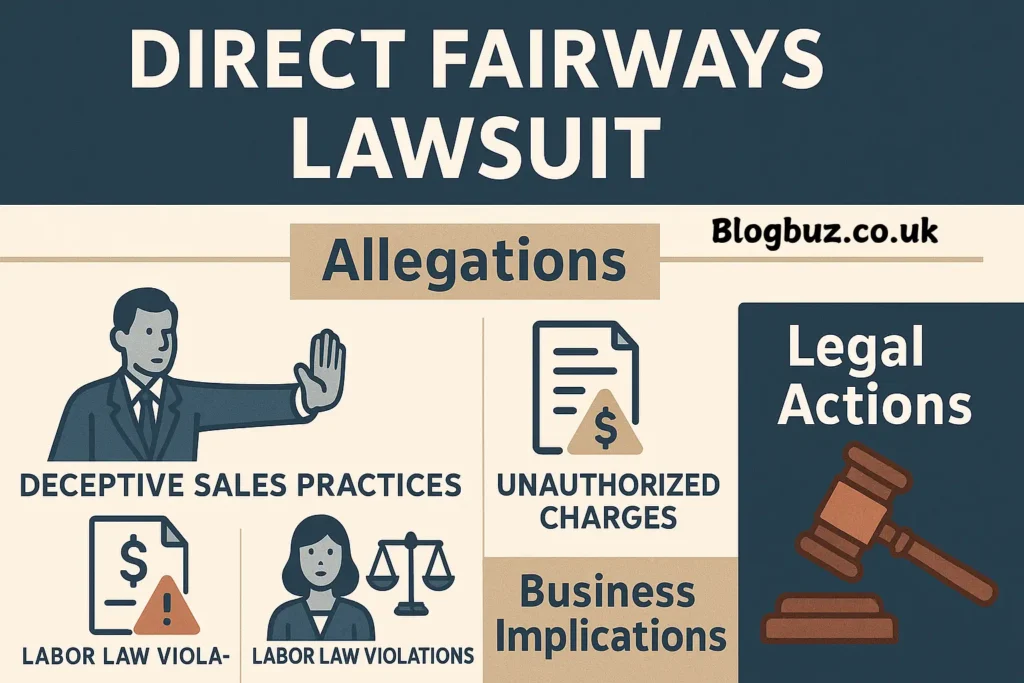The world of sports marketing and golf advertising saw a major shakeup with the Direct Fairways lawsuit. For many golf course owners, advertisers, and marketing professionals, Direct Fairways was once considered a dominant player in the niche market of golf course marketing. However, the legal troubles and allegations facing the company have brought many questions to light—questions about ethics, business practices, and consumer protection.
In this comprehensive article, we will explore the background of the Direct Fairways lawsuit, the allegations involved, its impact on the golf marketing industry, and what businesses can learn from this high-profile case.
What is Direct Fairways?
Direct Fairways is (or was) a marketing agency that specialized in advertising for golf courses across the United States. Based in Arizona, the company claimed to offer unique advertising opportunities through scorecards, tee signs, and other golf course materials. Their services were marketed to local businesses as a way to reach affluent audiences in a relaxed and targeted environment.
On the surface, this model seemed promising. Golfers represent a lucrative demographic, and local businesses are always looking for unique ways to reach them. However, as time went on, complaints began to surface regarding the company’s business practices.
The Emergence of the Direct Fairways Lawsuit
The Direct Fairways lawsuit first caught public attention after a growing number of businesses and former employees began sharing their experiences. Several complaints were filed with the Better Business Bureau (BBB), and legal investigations soon followed. Allegations included deceptive sales tactics, unauthorized charges, failure to deliver promised advertising, and aggressive collection practices.
Key Allegations:
- Misrepresentation of Services: Businesses claimed they were promised ad placements on golf course materials but never saw the final product.
- Unfulfilled Contracts: Some customers alleged that Direct Fairways took payments but did not fulfill their advertising obligations.
- Harassment and Coercion: There were reports of pushy sales representatives and even aggressive debt collection from businesses who tried to cancel contracts.
- Lack of Refunds: In many cases, clients who were dissatisfied with the service were denied refunds, even when they had legitimate complaints.
The Legal Proceedings: Where Does the Lawsuit Stand?
As of the latest reports, several lawsuits have been filed against Direct Fairways, both from individuals and business entities. These suits generally fall into two categories: civil lawsuits from disgruntled clients and employment-related claims from former employees.
Civil Lawsuits
These typically revolve around:
- Breach of contract
- Fraud and misrepresentation
- Unfair business practices
Employment Lawsuits
In addition to client complaints, former employees of Direct Fairways have come forward with their own allegations, including:
- Wage theft
- Hostile work environment
- Misleading training and onboarding processes
As legal proceedings continue, more information is expected to emerge. At this point, the company has not publicly admitted to any wrongdoing, but the mounting legal pressure and negative publicity have significantly tarnished its reputation.
Impact on the Golf Marketing Industry
The Direct Fairways lawsuit has had a ripple effect across the golf marketing landscape. Golf courses that once partnered with the company have become more cautious. Local businesses, too, are now more vigilant when selecting marketing vendors. This case has also triggered a broader conversation about transparency in advertising, particularly in niche industries like sports and recreation.
What Golf Courses Are Doing Differently Now
- Vetting marketing partners more carefully
- Asking for references and portfolios
- Requiring written guarantees and timelines
- Seeking more digital-based marketing solutions
This shift is leading to a more tech-driven and data-centric approach in golf advertising, with many courses opting for online marketing, social media campaigns, and email newsletters instead of relying solely on physical materials like scorecards or signs.
How to Avoid Falling Victim to Similar Scams
For businesses, especially small local enterprises, being targeted by deceptive marketing agencies can be costly and frustrating. Here are some practical tips to help you steer clear of questionable marketing schemes:
1. Do Thorough Research
Always check for:
- BBB ratings
- Online reviews (Google, Yelp)
- Complaints on consumer protection websites
2. Demand a Written Contract
Avoid verbal promises. Make sure everything—including deliverables, timelines, and refund policies—is documented.
3. Ask for Examples
Request case studies, testimonials, or even samples of past work.
4. Avoid High-Pressure Sales Tactics
Legitimate businesses don’t pressure you into signing contracts on the spot. If a representative is overly aggressive, that’s a red flag.
5. Use Payment Protection
Whenever possible, use a credit card or a secure online payment platform that offers dispute resolution in case of fraud.
Lessons for the Advertising Industry
The Direct Fairways lawsuit isn’t just a cautionary tale for clients—it’s also a wake-up call for advertising agencies. The demand for ethical business practices, transparency, and client satisfaction has never been higher.
Agencies Should:
- Deliver on promises
- Be clear about pricing and services
- Offer measurable ROI
- Be responsive to client concerns
Advertising, especially in niche markets like golf or sports, thrives on trust. One scandal can severely damage not only a company’s reputation but also erode industry-wide credibility.
Conclusion: A Case Study in Accountability
The Direct Fairways lawsuit underscores the importance of accountability, both for businesses offering services and those purchasing them. It also highlights the growing role of public feedback, legal regulation, and ethical marketing practices in today’s business world.
As more details unfold, the lawsuit serves as a powerful reminder to always do your due diligence—whether you’re a golf course looking for advertisers or a local business seeking exposure. The marketing industry is evolving, and there’s no place for deceptive practices in a world that values integrity and results.


